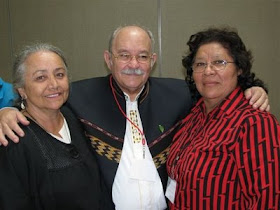 Naniki Reyes Ocasio (Boriken Taino), UN General Assembly President Miguel d'Escoto Brockmann, and Hariette Vreedzaam - Joeroeja (Galibi - Suriname) express their solidarity at the Global Indigenous Peoples' Summit on Climate Change in Alaska.
Naniki Reyes Ocasio (Boriken Taino), UN General Assembly President Miguel d'Escoto Brockmann, and Hariette Vreedzaam - Joeroeja (Galibi - Suriname) express their solidarity at the Global Indigenous Peoples' Summit on Climate Change in Alaska.Anchorage, Alaska (UCTP Taíno News) - The Global Indigenous Peoples' Summit on Climate Change being held in Alaska concluded on Friday. The Summit was held at the Dena-Ina Center in the city of Anchorage over a span of five days; from April 20th-24th 2009. Over 400 Indigenous Peoples representatives from over 80 countries around the world participated - including a very visible Caribbean delegation.
Many statistics were presented at the Summit such as the fact that there are approximately 400 million Indigenous People on Earth, which translates to 1 out of every 15 human beings on the planet today as being an Indigenous person.
There were 2 guest speakers of particular note, the first was the famous Catholic Priest turned leftist Guerrilla turned President of the United Nations General Assembly - Miguel d'Escoto Brockman; who was enthusiastically applauded when he stated unapologetically "Now is not the time to pull any punches, we must call a spade a spade, the Third World cannot afford to subsidize the First World any more through unjust debt repayments - while developed countries portray themselves as the 'Charitable donors' coming to the financial rescue & relief of the 'pitiable beggars' - which is how they portray the developing countries".
Bolivia's energetic Foreign Minister Mr. David Choquehuanca received a standing ovation after he declared "We Indigenous Peoples are not the ones responsible for this human induced Climate change, but we are the ones suffering from it first and most severely so far, life is at risk, the non-indigenous have to realize and accept the fact that the Earth is our mother, and all living things are her children - and are sustained by her milk; which is called water. Water is precious, it is sacred, and it is the source of life for everything on this planet. The world has to take a Pro-Life stance now, not just for human life but for all life, for man is not separate from the natural world - he is an inseparable part of it!"
Another important fact revealed at the summit was that the average temperature of the world has already increased by one degree Celsius - and this has caused a world-wide depletion of soil fertility, aquifers, ocean fisheries, and bio-diversity in general - not to mention created severe weather phenomena. If the global temperature increases by only one degree more (and more than that is projected) - this will mean the collapse of ecosystems from coral reefs to polar ice caps, at 3-4 degrees Celsius in increase we will witness massive loss of species (and extinction is forever) and food crops.
Rising temperature is already causing an increase in vector borne diseases such as Malaria and West Nile virus.
Medical research has also shown that Indigenous communities that no longer produce the food they require to feed themselves - but instead rely on an imported purchased diet of processed foods and carbonated beverages - now suffer from Diabetes and a host of preventable diseases hitherto unknown in their communities.
The concerns of the Caribbean region were vigorously represented by 9 delegates including Bartolo Teul and Vincent Palacio (Belize), Naniki Reyes Ocasio (Puerto Rico), Chief Charles Williams and Pearl Williams (Dominica), Melford Pompei (St. Vincent and the Grenadines), Damon Corrie (Barbados), and Cyrilene Francis and Hariette Vreedzaam - Joeroeja (Suriname). Damon Corrie of the Eagle Clan Arawaks noted that "9 is a sacred number for the Lokono and other Indigenous People in the region".
The Summit's executive committee was comprised of Patricia Cochran (Arctic) - Chair of the Inuit Circumpolar Council, Andrea Carmen (North America) - Executive Director of the International Indian Treaty Council, Ben Namakin (Pacific) - Program Manager of the Environmental Education & Awareness Program Conservation Society of Pohnpei, Joseph Ole Simel (Africa) - National Coordinator of the Mainyoito Pastoralist Integrated Development Organization of the Massai, Victoria Tauli-Corpuz (Asia) - Chair of the United Nations Permanent Forum on Indigenous Issues, Executive Director of Tebtebba, and Convener of the Asia Indigenous Women's Network, Tarcila Rivera Zea (Latin America) - Executive Director of the Centro de Culturas Indigenous del Peru), and Cletus Springer (Caribbean) - Director of the Department of Sustainable Development of the Organization of American States.
A Declaration from the Summit will be presented to the United Nations General Assembly by President Miguel d'Escoto Brockmann on behalf of the Indigenous Peoples of the World.
The Indigenous Peoples' Global Summit on Climate Change was sponsored by the monetary donations of the Christensen Fund, the Ford Foundation, the Oak Foundation, the Government of Denmark, the John D. and Catherine J. MacArthur Foundation, the Government of Sweden - and 16 other sponsors.
UCTPTN 04.25.2009








